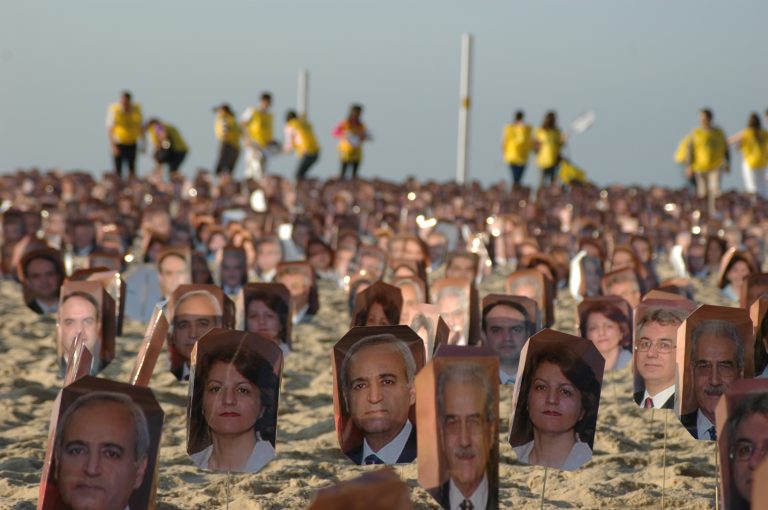
Image by Comunidade Bahá'í do Brasil/Flickr, cc by 2.0.
A Dark Privilege: Bearing Witness to Victims and Prisoners of Conscience in Iran
In a dim office in south London, I am alone at my computer. The shadows of trains pass in front of the sun. In the alley, a man begins tuning his guitar. One by one, I open the files I have been assigned to catalogue. One by one, I unlock a face, a name, a story. There are over two hundred. A community of believers who died for their faith.
I am constructing a wall of memory. Names, photographs. And for those without a snapshot, a single red candle, unflickering in virtual space.
This should be ancient history. This should be a research paper on early Christian martyrs. Every file should bear names and dates far removed from modern consciousness. But instead, I find myself looking at high school students, mothers, newlyweds, grandparents. Men in flared pant suites and lipsticked girls with fiery eyes. Their dates of death are a rough variation on a theme: 1980, 1981, 1983.
In 1979, Iranians overthrew the Shah for a new Islamic republic, led by a Supreme Leader, Ayatollah Khomeini. Now, in the clergy-controlled state, there are only four official religions: Islam (preferrably Shi’ism), Christianity, Judaism, and Zoroastrianism.
Left off the list is Iran’s largest religious minority, the Bahá’í Faith, whose followers are deemed heretics and systematically persecuted. The persecutions began at the religion’s birth, when its founder, Baha’u’llah, declared his revelation in 1863. Thousands of Iranians converted to the Faith, leading to mass arrests and killings, the destruction of Bahá’í property, and the banning of students from places of learning.
With intermittent lulls, the arrests and hate crimes continue to the present day. In May 2008, seven Bahá’í leaders were arrested and thrown into prison, for the simple fact of their beliefs. Their arrests were an eerie reminder of the abduction of the Bahá’í leadership in 1981. That year, all nine members of the Iranian Bahá’í Spiritual Assembly disappeared. They are presumed dead.
In addition to targeting Bahá’í leadership, the Iranian government has made no secret of its efforts to bar Bahá’ís from education and employment. In a private memo signed by the Supreme Leader Ali Khamanei in 1991, the “Bahá’í question” was clearly and ominously addressed. Some excerpts:
“The government’s dealings with them must be in such a way that their progress and development are blocked.”
“They must be expelled from universities, either in the admission process or during the course of their studies, once it becomes known that they are Bahá’ís.”
“Deny them employment if they identify themselves as Bahá’ís.”
“Deny them any position of influence, such as in the educational sector, etc.”“A plan must be devised to confront and destroy their cultural roots outside the country.”
Today, these seven Bahá’í leaders have been in prison for five years. They are sentenced to 20 years, the longest to be served by prisoners of conscience in Iran today. All over the world, from Washington DC to London and Budapest, people are coming together to demand their release.
As I sat in that dark London office, alone with the faces and stories of women and men who refused to deny their faith and were put to death because of it, I began to see their sacrifice in a more human light. This is a world that too easily contains death and sacrifice in two-dimensional space, flattening out suffering into a stark chiaroscuro of darkness and light. But in some ways, this denies the relevance of their lives to ours. Although most of us will never be called upon to lay down our lives, each of us will be tested.
There is a dark privilege to being so close — in history’s time — to religious persecution. It enables us to remember the richness of human life and voice sacrificed to ignorance and hatred.
The privilege is that we are not left with only paper icons in a Book of Saints. We have living proof of the Iranian Bahá’ís’ sacrifice in the lives of their children and relatives. I encourage everyone who meets an Iranian Bahá’í not to be shy. Ask to hear their stories.
For me, the privilege of handling the files of executed Bahá’ís is that it enabled me to view these believers from another time and place as part of my own life story. And though we are left with only memories, these soul scraps are more precious to me than any physical remains.
They are traces of human beings who learned to drink the bitter with the sweet. Memories of weddings, a favorite poem, and the dreams a young girl who dove headfirst into the ocean, arms and legs flying.

Share your reflection